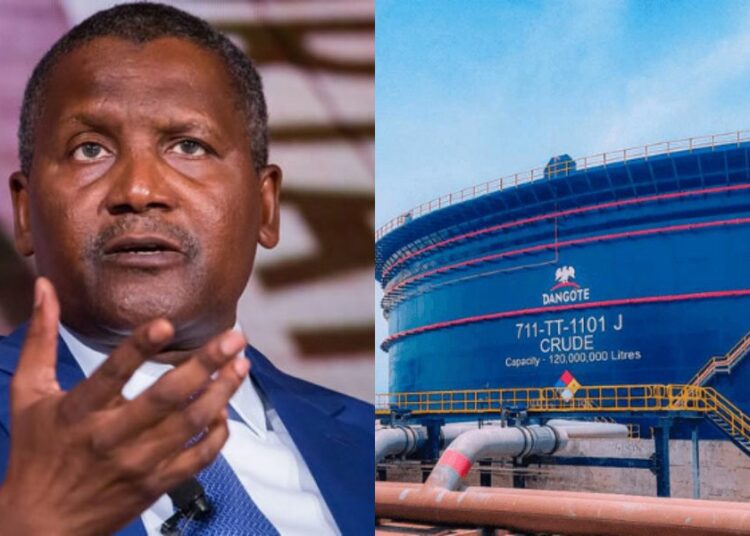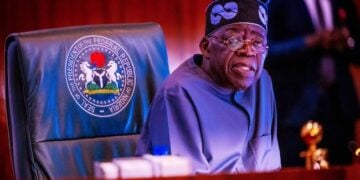Chairman of Dangote Group, Aliko Dangote, has disclosed that his refinery has more than enough fuel in reserve to meet Nigeria’s demand and that marketers should collect the available supply to alleviate the current scarcity.
He disclosed this to State House correspondents after President Bola Tinubu met with crude oil and refined product sales members in the local currency implementation committee.
The committee was led by the minister of finance and coordinating minister of the economy, Mr Wale Edun.
“We are more than ready to supply the market with 30 million litres daily,” Dangote assured, adding that his refinery holds 500 million litres of fuel in reserve.
“This is enough to sustain the country for over 12 days without new imports or production,” he added.
Dangote emphasised that his role is strictly that of a producer and bulk supplier, not a retail distributor, and urged marketers to take responsibility for distribution to filling stations.
“We are not in the retail business. I have a refinery, not filling stations,” he clarified. “If marketers come forward to collect, there will be no queues.”
Dangote also expressed his commitment to the government’s fuel supply goals, stating, “I’m putting my name on the line by assuring Mr President that we will supply a minimum of 30 million litres per day, ramping up as needed to stabilise the market.”
He also highlighted the financial impact of holding such a massive fuel reserve, explaining that it incurs daily costs, particularly with high interest rates.
“Every day, it costs me to maintain 500 million litres in our tanks. If I could recoup this investment, I could be charging 32% interest,” he noted, underscoring the urgency for marketers to act.
Dangote urged fuel marketers to prioritise local collection over imports.
“If marketers have been managing 55 million litres daily through imports, I see no reason they shouldn’t come and collect our supply and distribute it locally.”
He reaffirmed his refinery’s readiness to keep a steady supply. “We have what they need. As they collect, I will continue pumping. Our tanks are full, and we are ready to keep Nigeria’s fuel supply flowing smoothly if the marketers do their part.”
He also underscored the significance of Afreximbank’s role as a settlement bank between Dangote and the NNPCL, the aim of which is to streamline transactions within the crude oil market.
Pump Price Adjustment Reaction To Market Dynamics – Marketers
Petroleum products marketers have described the fresh pump adjustment of Premium Motor Spirit (PMS) at some retail outlets of the Nigerian National Petroleum Company Limited (NNPCL) as a reaction to market dynamics.
The new price was observed on Tuesday at NNPC filling stations in some parts of the country.
About three weeks ago, NNPC also hiked fuel prices to about N1,030 per litre in Abuja and N998 in Lagos.
The adjustment may see motorists paying about N1060 in Abuja and N1025 in Lagos.
The president of the Petroleum Products Retail Outlets Owners Association of Nigeria (PETROAN), Dr Billy Gills-Harry, told LEADERSHIP that Nigerians should always expect to see prices going up and down.
He said this is expected in a deregulated market and should not be seen as NNPCL arbitrarily raising the pump price.
According to him, prices can change depending on import parity, which is essentially expected in a free market operation.
Our Correspondent reports that earlier this month, the federal government explained the recent increase in petrol prices by the NNPCL, attributing it to global energy market conditions.
The minister of information and national orientation, Mohammed Idris, clarified that the NNPCL’s decision was influenced by market forces, not government directives, in line with the Petroleum Industry Act (PIA).
Meanwhile, the Finance Minister Wale Edun also shared insights from the meeting with President Tinubu on a new initiative enabling local refiners to purchase crude oil in Naira, a project fully backed by the Federal Executive Council.
Edun credited the Dangote Group’s substantial investment in its 650,000-barrel-per-day refinery as a crucial project enabler and emphasised collaboration with regulatory bodies like the Nigerian Midstream and Downstream Petroleum Regulatory Authority (NMDPRA) and Nigeria National Petroleum Company Ltd (NNPCL).
“What we have achieved is the establishment of market pricing for petroleum products,” he explained.
“This, coupled with market pricing for foreign exchange, sets our economy on a path toward industrialisation.”
He further highlighted the initiative’s broad economic impact, noting it would provide essential raw materials for various industries, from agriculture to chemicals and textiles.
“This is part of Mr President’s strategy to create favourable conditions for private sector investment, job creation, and economic growth,” Edun said.
Edun also stated that the new pricing structure is expected to strengthen NNPC’s financial position, enabling it to better support federal, state, and local governments.
“This will allow them to meet their obligations, including salary payments and infrastructure development,” he added.
While acknowledging the remaining challenges, Edun expressed optimism about Nigeria’s industrial development trajectory.
“Although it’s early days and much work remains, we now see a clear path toward modernising our economy,” he remarked, assuring stakeholders of the government’s commitment to overcoming initial hurdles linked to local crude sales in Naira.
“There is determination from the top downwards for this initiative to succeed,” he affirmed.
The meeting was attended by top officials, including the group chief executive officer of NNPCL, Mele Kyari; chairman of the Federal Inland Revenue Service, Zacch Adedeji; governor of the Central Bank of Nigeria, Yemi Cardoso; chief executive of NMDPRA, Farouk Ahmed, and the chief executive of the Nigerian Upstream Petroleum Regulatory Commission, Gbenga Komolafe.
It is recalled that President Tinubu had , on July 29, directed NNPCL to commence crude sales to the Dangote Refinery and other local refiners, with Afreximbank appointed as the pilot settlement bank to oversee transactions.
Ghana Eyes Fuel Imports From Dangote Refinery
Ghana could buy petroleum products from Nigeria’s Dangote Petroleum Refinery once the facility is operating at total capacity, cutting more expensive European exports, the head of the country’s oil regulator said on Monday.
According to a Reuters report, the chairman of the National Petroleum Authority, Ghana Mustapha Abdul-Hamid, said this could end monthly fuel imports of $400m from Europe.
He spoke at the OTL Africa Downstream oil conference in Lagos.
The $20bn Lekki-based Dangote refinery began releasing Premium Motor Spirit, popularly called petrol, into the Nigerian market on September 15, 2024.
However, despite this, marketers of the product in Nigeria have since commenced importing PMS in hundreds of millions of litres following the federal government’s total deregulation of the downstream oil sector in Nigeria.
However, at the function in Lagos on Monday, the Ghanaian petroleum authority official stated that his country might start importing fuel from the Nigerian refinery.
“If the refinery reaches 650,000 bpd a day capacity, all that volume cannot be consumed by Nigeria alone; so instead of us importing as we do right now from Rotterdam, it will be much easier for us to import from Nigeria, and I believe that will bring down our prices,” Hamid said.
The Dangote refinery, built by billionaire Aliko Dangote, is expected to operate near total capacity by the end of the year, and analysts believe it could be fully operational in the first quarter of 2025.
Allow Market To Determine Profit, Loss In Oil Sector- Tinubu
…Urges oil stakeholders to end reliance on import
President Bola Tinubu, speaking Tuesday in Abuja, commended the Implementation Committee on selling Naira-based crude oil and refined products and asked the members to resolve any teething problems.
In a review meeting at the State House, the President, in a statement by his spokesman, Bayo Onanuga, said that using the Naira was conceived to remove the exchange rate hurdle.
“Whatever solution we proffer in crude oil and refined products sales in Naira should not take us back to our experience in the last 40 years.
“There can be cost and revenue adjustment in the oil sector, but the issue is that the government will not have to go back to the old way of doing things,’’ the president stated.
President Tinubu said the various players in the oil sector, including the Nigerian National Petroleum Corporation Ltd and the Dangote Refinery, should work to improve the economy and the livelihood of Nigerians.
The President urged stakeholders to look inward, consider supplying enough petrol and petroleum products for local consumption, and stop the persistent reliance on importation.
He said this would enable the channelling of foreign exchange into the development of the real sector.
The President advised stakeholders to use Afreximbank as a settlement bank to resolve the Naira pricing for crude and refined products. Afreximbank is already on board as the financial adviser.
“The market must determine what we are doing. Once you allow the market to determine the profit and loss, independent marketers and the government side can meet on the worksheet. I want the issues resolved without future waste of time,’’ he added.
“We can have energy security, and the motivation for Alhaji Aliko Dangote will not be defeated. It will be more predictable on a medium and long-term basis,’’ the President said.
Minister of finance and coordinating minister of the economy, Wale Edun, said the administration’s groundbreaking steps to sell crude in Naira would not be reversed, and the government would not be involved in determining the rate of exchange for the oil sector.
The President and Chief Executive of Dangote Group told the President that the refinery had more than 500 million litres of fuel in reserve after supplying 400 million to the economy.
He said the refinery could collaborate with the other refineries managed by NNPC Ltd to meet an estimated 32 million litres of local petrol needs.
At the meeting, the Federal Inland Revenue Service chairman, Zach Adedeji, who chairs the technical committee, said importing refined products should end once Nigeria can produce enough to meet domestic needs.
“The vision of Mr President is to turn Nigeria into a hub for refined products to export to the world.”Other stakeholders at the meeting included Prof. Benedict Oramah, the president and chairman of the Board of Afrexim Bank, and Sen. Abubakar Atiku Bagudu, the minister of budget and national planning and group managing director of NNPC Limited, Mele Kyari.
The president’s special adviser on energy, Olu Verheijen, and the CEOs of NIMASA and Nigerian Ports Authority also attended, along with Engineer Gbenga Komolafe, head of Upstream Regulator, and Farouk Ahmed, head of Midstream and Downstream Regulator, NMDPRA.
Marketers Say Pump Price Adjustment At NNPCL Stations, Reaction To Market Dynamics
Petroleum products marketers have described the fresh pump adjustment of Premium Motor Spirit (PMS) at some retail outlets of the Nigerian National Petroleum Company Limited (NNPCL) as a reaction to market dynamics.
The new price was observed on Tuesday at NNPC filling stations in some parts of the country.
About three weeks ago, NNPC also hiked fuel prices to about N1,030 per litre in Abuja and N998 in Lagos.
The adjustment may see motorists paying about N1060 in Abuja and N1025 in Lagos.
The president of the Petroleum Products Retail Outlets Owners Association of Nigeria (PETROAN), Dr Billy Gills-Harry, told LEADERSHIP that Nigerians should always expect to see prices going up and down.
He said this is expected in a deregulated market and should not be seen as NNPCL arbitrarily raising the pump price.
According to him, prices can change depending on import parity, which is essentially expected in a free market operation.
Our Correspondent reports that earlier this month, the federal government explained the recent increase in petrol prices by the NNPCL, attributing it to global energy market conditions.
The minister of information and national orientation, Mohammed Idris, clarified that the NNPCL’s decision was influenced by market forces, not government directives, in line with the Petroleum Industry Act (PIA).





